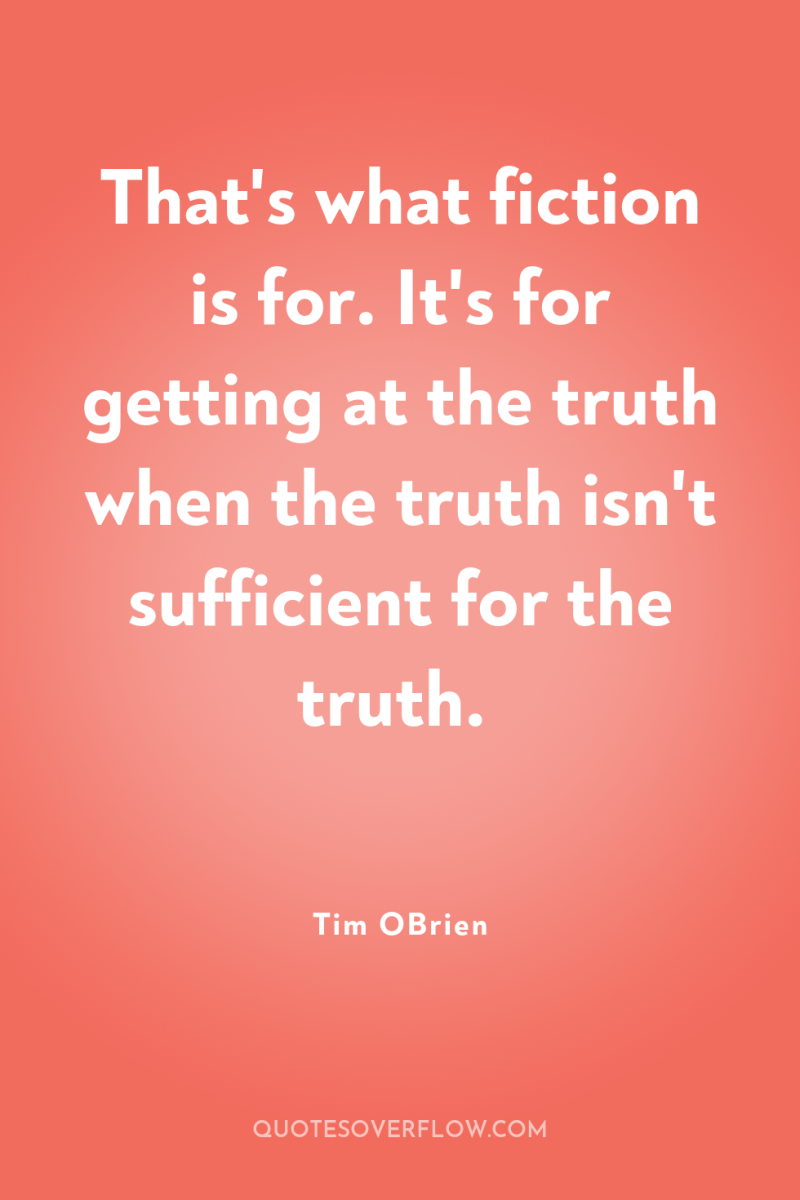
That's what fiction is for. It's for getting at the truth when the truth isn't sufficient for the truth.Tim OBrien
A lie, sometimes, can be truer than the truth, which is why fiction gets written.Tim OBrien
In any war story, but especially a true one, it's difficult to separate what happened from what seemed to happen. What seems to happen becomes its own happening and has to be told that way. The angles of vision are skewed. When a booby trap explodes, you close your eyes and duck and float outside yourself.. The pictures get jumbled, you tend to miss a lot. And then afterward, when you go to tell about it, there is always that surreal seemingness, which makes the story seem untrue, but which in fact represents the hard and exact truth as it seemed.Tim OBrien
It’s a hard thing to explain to somebody who hasn’t felt it, but the presence of death and danger has a way of bringing you fully awake. It makes things vivid. When you’re afraid, really afraid, you see things you never saw before, you pay attention to the world. You make close friends. You become part of a tribe and you share the same blood- you give it together, you take it together.Tim OBrien
The thing about a story is that you dream it as you tell it, hoping that others might then dream along with you, and in this way memory and imagination and language combine to make spirits in the head. There is the illusion of aliveness.Tim OBrien
A good piece of fiction, in my view, does not offer solutions. Good stories deal with our moral struggles, our uncertainties, our dreams, our blunders, our contradictions, our endless quest for understanding. Good stories do not resolve the mysteries of the human spirit but rather describe and expand up on those mysteries.Tim OBrien
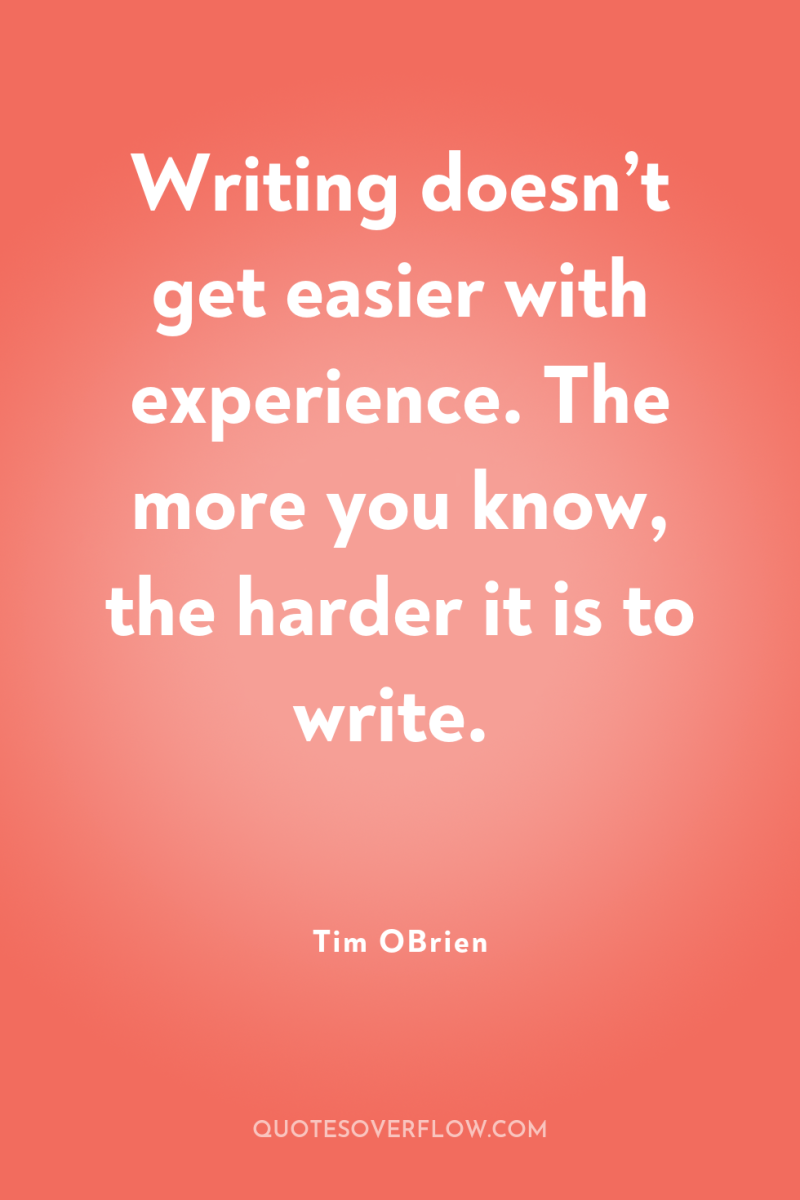
Writing doesn’t get easier with experience. The more you know, the harder it is to write.Tim OBrien
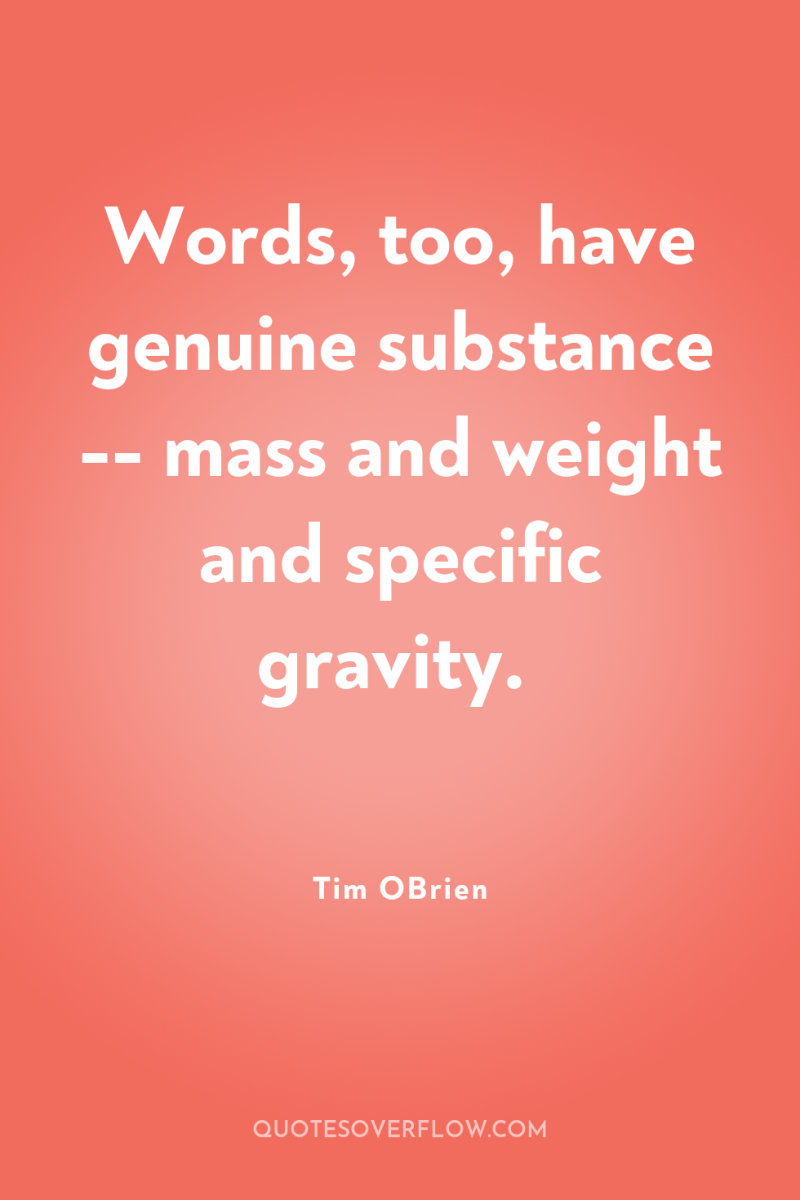
Words, too, have genuine substance -- mass and weight and specific gravity.Tim OBrien
Forty-three years old, and the war occurred half a lifetime ago, and yet the remembering makes it now. And sometimes remembering will lead to a story, which makes it forever. That’s what stories are for. Stories are for joining the past to the future. Stories are for those late hours in the night when you can’t remember how you got from where you were to where you are. Stories are for eternity, when memory is erased, when there is nothing to remember except the story.Tim OBrien

With a hangover and with fear, it is difficult to put a helmet on your head.Tim OBrien
A true war story is never moral. It does not instruct, nor encourage virtue, nor suggest models of proper human behavior, nor restrain men from doing the things men have always done. If a story seems moral, do not believe it. If at the end of a war story you feel uplifted, or if you feel that some small bit of rectitude has been salvaged from the larger waste, then you have been made the victim of a very old and terrible lie. There is no rectitude whatsoever. There is no virtue. As a first rule of thumb, therefore, you can tell a true war story by its absolute and uncompromising allegiance to obscenity and evil. .Tim OBrien
It was my view then, and still is, that you don't make war without knowing why. Knowledge of course, is always imperfect, but it seemed to me that when a nation goes to war it must have reasonable confidence in the justice and imperative of its cause. You can't fix your mistakes. Once people are dead, you can't make them undead.Tim OBrien
You can tell a true war story if it embarrasses you. If you don't care for obscenity, you don't care for the truth; if you don't care for the truth, watch how you vote. Send guys to war, they come home talking dirty.Tim OBrien
I'm skimming across the surface of my own history, moving fast, riding the melt beneath the blades, doing loops and spins, and when I take a high leap into the dark and come down thirty years later, I realize it is as Tim trying to save Timmy's life with a story.Tim OBrien
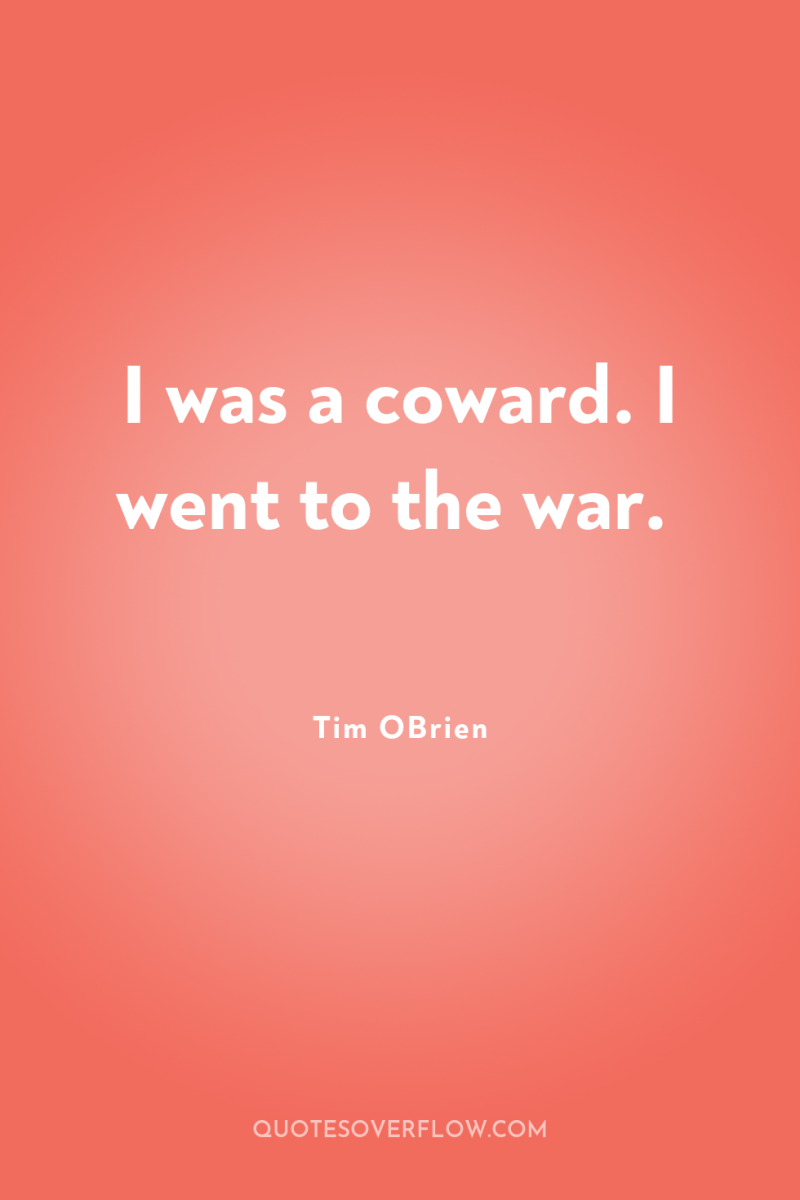
I was a coward. I went to the war.Tim OBrien
Mitchell Sanders was right. For the common soldier, at least, war has the feel-the spiritual texture-of a great ghostly fog, thick and permanent. There is no clarity. Everything swirls. The old rules are no longer binding, the old truths no longer true. Right spills over into wrong. Order blends into chaos, love into hate, ugliness into beauty, law into anarchy, civility into savagery. The vapors suck you in. You can't tell where you are, or why you're there, and the only certainty is overwhelming ambiguity.Tim OBrien
They did not submit to the obvious alternative, which was simply to close the eyes and fall. So easy, really. Go limp and tumble to the ground and let the muscles unwind and not speak and not budge until your buddies picked you up and lifted you into the chopper that would roar and dip its nose and carry you off to the world. A mere matter of falling, yet no one ever fell. It was not courage, exactly; the object was not valor. Rather, they were too frightened to be cowards.Tim OBrien
First Lieutenant Jimmy Cross carried letters from a girl named Martha, a junior at Mount Sebastian College in New Jersey. They were not love letters, but Lieutenant Cross was hoping, so he kept them folded in plastic at the bottom of his rusack. In the late afternoon, after a day's march, he would dig his foxhole, wash his hands under a canteen, unwrap the letters, hold them with the tips of his fingers, and spend the last hour of light pretending.Tim OBrien
To generalize about war is like generalizing about peace. Almost everything is true. Almost nothing is true. At its core, perhaps, war is just another name for death, and yet any soldier will tell you, if he tells the truth, that proximity to death brings with it a corresponding proximity to life. After a firefight, there is always the immense pleasure of aliveness. The trees are alive. The grass, the soil–everything. All around you things are purely living, and you among them, and the aliveness makes you tremble. You feel an intense, out-of-the-skin awareness of your living self–your truest self, the human being you want to be and then become by the force of wanting it. In the midst of evil you want to be a good man. You want decency. You want justice and courtesy and human concord, things you never knew you wanted. There is a kind of largeness to it, a kind of godliness. Though it’s odd, you’re never more alive than when you’re almost dead. You recognize what’s valuable. Freshly, as if for the first time, you love what’s best in yourself and in the world, all that might be lost. At the hour of dusk you sit at your foxhole and look out on a wide river turning pinkish red, and at the mountains beyond, and although in the morning you must cross the river and go into the mountains and do terrible things and maybe die, even so, you find yourself studying the fine colors on the river, you feel wonder and awe at the setting of the sun, and you are filled with a hard, aching love for how the world could be and always should be, but now is not.Tim OBrien
A few names were known in full, some in part, some not at all. No one cared. Except in clearly unreasonable cases, a soldier was generally called by the name he preferred, or by what he called himself, and no great effort was made to disentangle Christian names from surnames from nicknames.Tim OBrien
In the next days it took little provocation for us to flick the flint of our Zippo lighters. Thatched roofs take the flame quickly, and on bad days the hamlets of Pinkville burned, taking our revenge in fire. It was good to walk from Pinkville and to see fire behind Alpha Company. It was good, just as pure hate is good.Tim OBrien
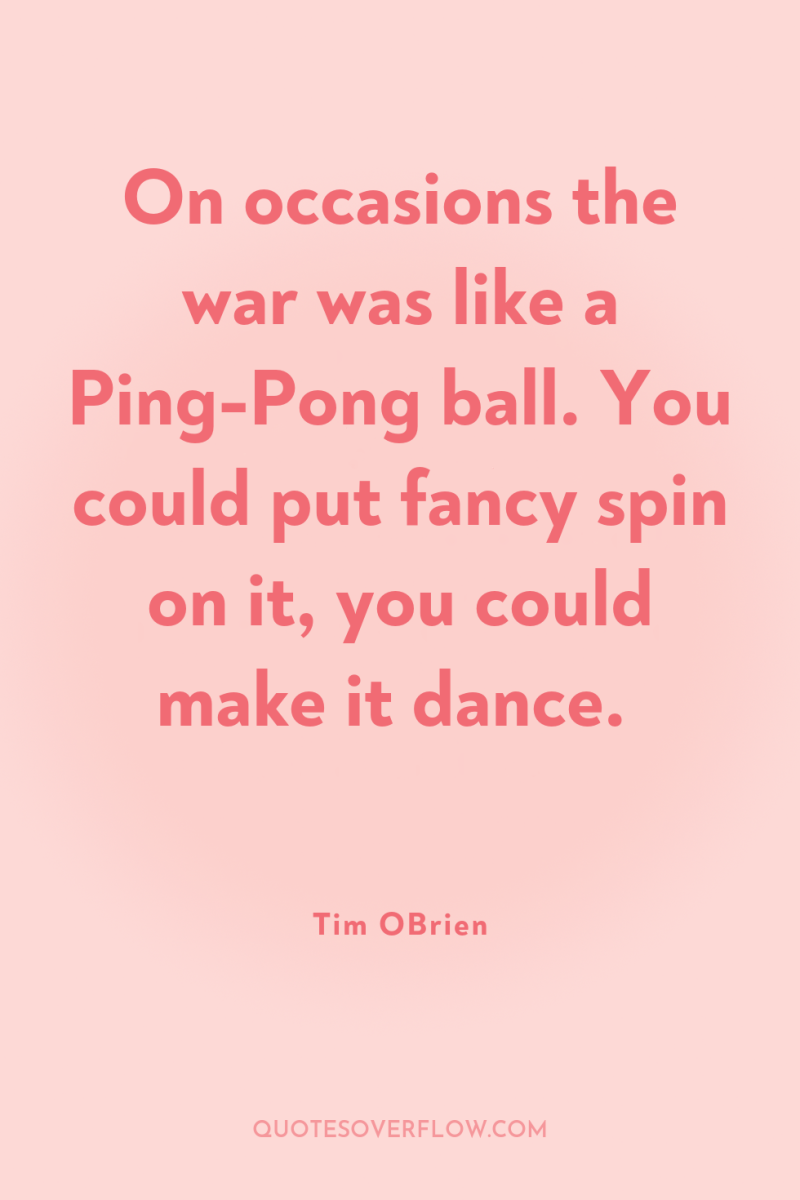
On occasions the war was like a Ping-Pong ball. You could put fancy spin on it, you could make it dance.Tim OBrien

They would repair the leaks in their eyes.Tim OBrien
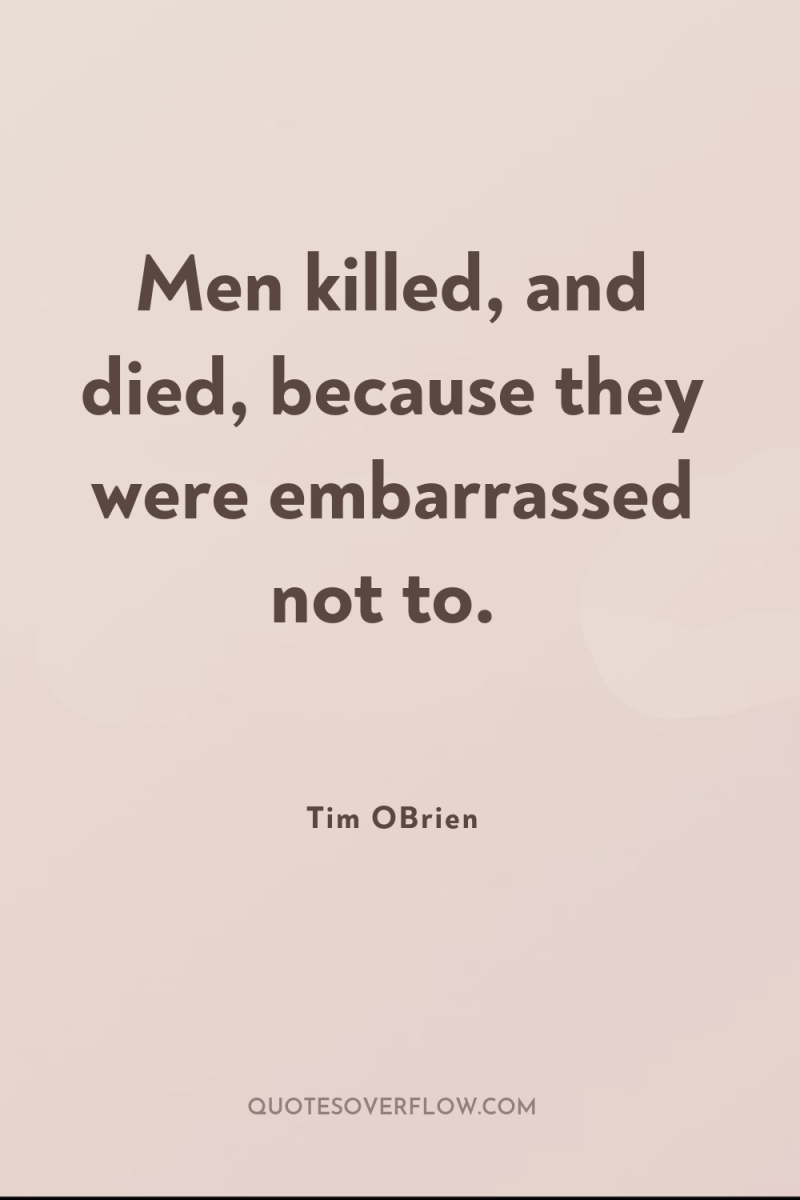
Men killed, and died, because they were embarrassed not to.Tim OBrien

He wanted to heat up the truth, to make it burn so hot that you would feel exactly what he felt.Tim OBrien

I hated him for making me stop hating himTim OBrien
They used a hard vocabulary to contain the terrible softness. Greased they'd say. Offed, lit up, zapped while zipping. It wasn't cruelty, just stage presence. They were actors. When someone died, it wasn't quite dying, because in a curious way it seemed scripted, and because they had their lives mostly memorized, irony mixed with tragedy, and because they called it by other names, as if to encyst and destroy the reality of death itself.Tim OBrien
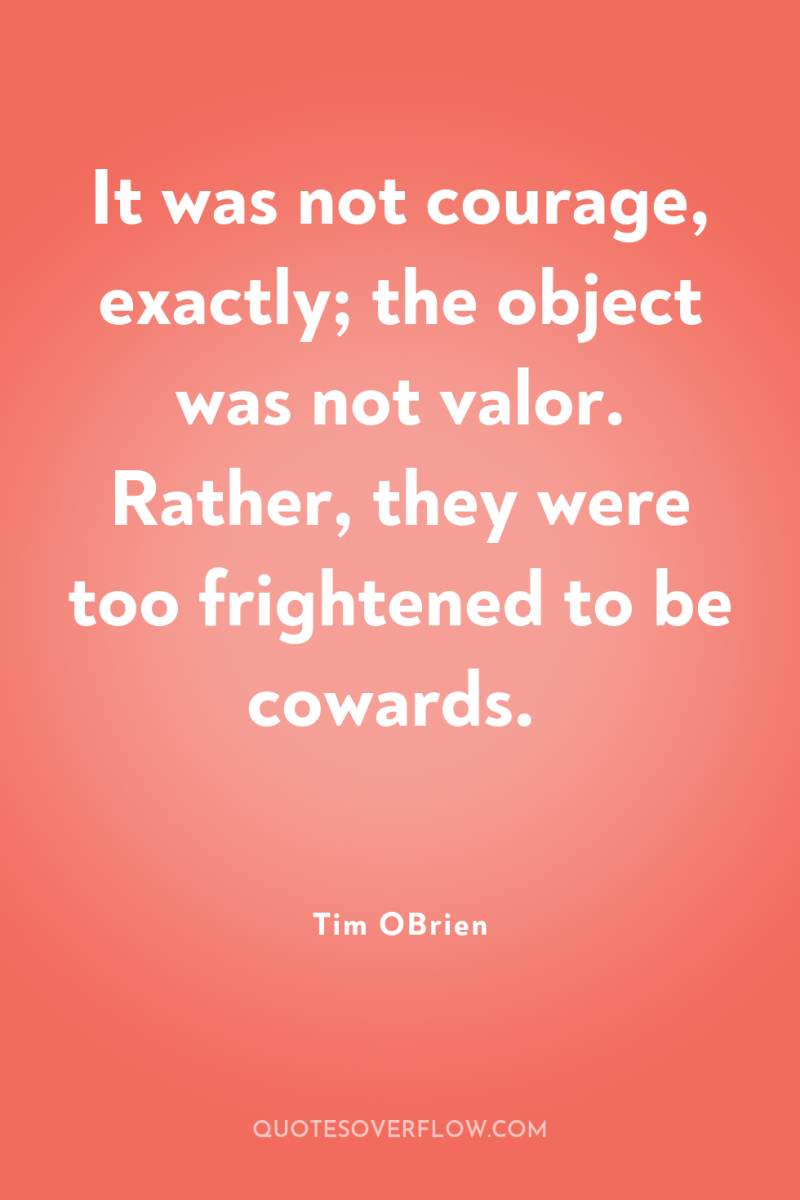
It was not courage, exactly; the object was not valor. Rather, they were too frightened to be cowards.Tim OBrien
The afternoon had passed to a ghostly gray. She was struck by the immensity of things, so much water and sky and forest, and after a time it occurred to her that she’d lived a life almost entirely indoors. Her memories were indoor memories, fixed by ceilings and plastered white walls. Her whole life had been locked to geometries: suburban rectangles, city squares. First the house she’d grown up in, then dorms and apartments. The open air had been nothing but a medium of transit, a place for rooms to exist.Tim OBrien
Courage is nothing to laugh at, not if it is proper courage and exercised by men who know what they do is proper. Proper courage is wise courage. It's acting wisely, acting wisely when fear would have a man act otherwise. It is the endurance of the soul in spite of fear - wisely.Tim OBrien
Imagination, like reality, has its limits.Tim OBrien
What stories can do, I guess, is make things present. I can look at things I never looked at. I can attach faces to grief and love and pity and God. I can be brave. I can make myself feel again.Tim OBrien
It was a flight, a kind of fleeing, a kind of falling, falling higher and higher, spinning off the edge of the earth and beyond the sun and through the vast silent vacuum where there were no burdens and where everything weighed exactly nothing.Tim OBrien
Zapped while zipping.Tim OBrien
We are fascinated, all of us, by the implacable otherness of others. And we wish to penetrate by hypothesis, by daydream, by scientific investigation those leaden walls that encase the human spirit, that define it and guard it and hold it forever inaccessible.Tim OBrien
At what point, ” he asked, “does one decide on rafters and a rope? Answer: no points to be had. There is merely what happened, what is now happening and what will one day happen. Do we choose sleep? Hell no and bullshit — we fall. We give ourselves over to possibility, to whim and fancy, to the bed, the pillow, the tiny white tablet. And these choose for us. Gravity has a hand. Bear in mind trapdoors. We fall in love, yes? Tumble, in fact. Is it choice? Enough said.Tim OBrien
But truly it was not the money that mattered. It was the distant glitter of everything that was possible in the world, the things she had always wanted for herself and could not name and called happiness because there was no other word.Tim OBrien
He'd been coiled like a snake for years and the tension had gone slack and when he was ready to spring the spring wasn't there, but it could be recoiled.Tim OBrien
I would wish this book could take the form of a plea for everlasting peace, a plea from one who knows.. Or it would be fine to confirm the odd beliefs about war: it's horrible, but it's a crucible of men and events and, in the end, it makes more of a man out of you. But, still, none of these notions seems right. Men are killed, dead human beings are heavy and awkward to carry, things smell different in Vietnam, soldiers are afraid and often brave, drill sergeants are boors, some men think the war is proper and just and others don't and most don't care. Is that the stuff for a morality lesson, even for a theme? Do dreams offer lessons? Do nightmares have themes, do we awaken and analyze them and live our lives and advise others as a result? Can the foot soldier teach anything important about war, merely for having been there? I think not. He can tell war stories.Tim OBrien
If you don't care for obscenity, you don't care for the truth.Tim OBrien
I detested their blind, thoughtless, automatic acquiescence to it all, their simpleminded patriotism, their prideful ignorance, their love-it-or-leave-it platitudes, how they were sending me off to a war they didn't understand and didn't want to understand. I held them responsible. By God, yes, I did. All of them - I held them personally and individually responsible - the polyestered Kiwanis boys, the merchants and the farmers, the pious churchgoers, the chatty housewives, the PTA and the Lions club and the Veterans of Foreign Wars and the fine outstanding gentry out at the country club. They didn't know Bao Dai from the man in the moon. They didn't know history. They didn't know the first thing about Diem's tyranny, or the nature of Vietnamese nationalist, or the long colonialism of the French - this was all too damn complicated, it required some reading - but no matter, it was a war to stop the Communists, plain and simple, which was how they liked things, and you were a treasonous pussy if you had second thoughts about killing or dying for plain and simple reasons. .Tim OBrien
I suppose if we gain anything from this unsought experience it will be an appreciation for honesty- frankness on the part of our politicians, our friends, our loves, ourselves. No more liars in public places. (And the bed and the bar are, in their way, as public as the floor of Congress.)Tim OBrien
But I do like churches. The way it feels inside. It feels good when you just sit there, like you're in a forest and everything's really quiet, except there's still this sound you can't hear.Tim OBrien
Stories can save us.Tim OBrien
Stories are for joining the past to the future.Tim OBrien
What stories can do, I guess, is make things present.Tim OBrien
And in the end, really, there's nothing much to say about a true war story, except maybe "Oh.Tim OBrien
In many ways he was like America itself, big and strong, full of good intentions, a roll of fat jiggling at his belly, slow of foot but always plodding along, always there when you needed him, a believer in the virtues of simplicity and directness and hard labor.Tim OBrien
I survived, but it's not a happy ending.Tim OBrien
Do we choose sleep? Hell no and bullshit - we fall. We give ourselves over to possibility, to whim and fancy, to the bed, to the pillow, the tiny white tablet. And these choose for us.Tim OBrien
…he wanted to sleep inside her lungs and breathe her blood and be smothered. He wanted her to be a virgin and not a virgin all at once. He wanted to know her. Intimate secrets: Why poetry? Why so sad? Why that grayness in her eyes? Why so alone? Not lonely, just alone - riding her bike across campus or sitting off by herself in the cafeteria - even dancing, she danced alone - and it was the aloneness that filled him with love. He remembered telling her that one evening. How she nodded and looked away. And how, later, when he kissed her, she received the kiss without returning it, her eyes wide open, not afraid, not a virgin’s eyes, just flat and uninvolved. .Tim OBrien
Whenever he told the story, Rat had a tendency to stop now and then, interrupting the flow, inserting little clarifications or bits of analysis and personal opinion. It was a bad habit, Mitchell Sanders said, because all that matters is the raw material, the stuff itself, and you can’t clutter it up with your own half-baked commentary. That just breaks the spell. It destroys the magic. What you have to do, Sanders said, is trust your own story. Get the hell out of the way and let it tell itself.Tim OBrien
You can't fix your mistakes. Once people are dead, you can't make them undead.Tim OBrien
You learn, finally, that you'll die, and so you try to hang on to your own life, that gentle, naive kid you used to be, but then after a while the sentiment takes over, and the sadness, because you know for a fact that you can't ever bring any of it back again. You just can't.Tim OBrien
Nostalgia-- that's the basic sickness, and I never heard of a doctor who can cure it.Tim OBrien
Don't throw away luck on little stuff. Save it up.Tim OBrien
In battle, in a war, a soldier sees only a tiny fragment of what is available to be seen. The soldier is not a photographic machine. He is not a camera. He registers, so to speak, only those few items that he is predisposed to register and not a single thing more. Do you understand this? So I am saying to you that after a battle each soldier will have different stories to tell, vastly different stories, and that when a was is ended it is as if there have been a million wars, or as many wars as there were soldiers.Tim OBrien
Each morning, despite the unknowns, they made their legs move.Tim OBrien
When a man died, there had to be blame. Jimmy Cross understood this. You could blame the war, You could blame the idiots who made the war. You could blame Kiowa for going to it. You could blame the rain. You could blame the river. You could blame the field, the mud, the climate. You could blame the enemy. You could blame the mortar rounds. You could blame people who were too lazy to read a newspaper, who were bored by the daily body counts, who switched channels at the mention of politics. You could blame whole nations. You could blame God. You could blame the munitions makers or Karl Marx or a trick of fate of an old man in Omaha who forgot to vote. .Tim OBrien
The object of storytelling, like the object of magic, is not to explain or to resolve, but rather to create and to perform miracles of the imagination. To extend the boundaries of the mysterious. To push into the unknown in pursuit of still other unknowns. To reach into one's heart, down into that place where the stories are, bringing up the mystery of oneself.Tim OBrien
Life is never all one thing. It bounces around. Certainly, my own life has. Look at Woody Allen's funny movies - all the humor comes out of sad stuff. Sometimes you have to laugh, no matter what life deals you.Tim OBrien
Love, as wonderful and horrible as it is, has at its center a kind of pitiful humor.Tim OBrien
Who do you call a civilian in a guerilla war? I mean, it might be a farmer by day or a merchant, a housewife, and by night the housewife may be helping to make landmines and booby traps and who knows.Tim OBrien
In fiction workshops, we tend to focus on matters of verisimilitude largely because such issues are so much easier to talk about than the failure of imagination.Tim OBrien
I received my draft notice right after graduation from college and had three months before going into the Army in September to think about it.Tim OBrien
I didn't get into writing to make money or get famous or any of that. I got into it to hit hearts, and man, when I get letters not just from the soldiers but from their kids, especially their kids, it makes it all worthwhile.Tim OBrien
Fiction, maybe art in general, is a tentative, uncertain enterprise; it's not science, it's an exploration, but you never find much in the way of answers.Tim OBrien
In the summer of 1954, after several years in Austin, Minnesota, our family moved across the state to the small, rural town of Worthington, where my dad became regional manager for a life insurance company. To me, at age 7, Worthington seemed a perfectly splendid spot on the earth.Tim OBrien
I know what it is to feel unloved, to want revenge, to make mistakes, to suffer disappointment, yet also to find the courage to go forward in life.Tim OBrien
I learned that moral courage is harder than physical courage.Tim OBrien
Fantasy has a dark side to it. It also has a light hemisphere - the power of the human imagination to keep going, to imagine a better tomorrow.Tim OBrien
The wars don't end when you sign peace treaties or when the years go by. They will echo on until I'm gone and all the widows and orphans are gone.Tim OBrien
Poetry is not an issue of form and enjambments. Poetry, as the word is classically used, has to do with sound and sense. It can be rhyme. It can be rhythm, pace, breath.Tim OBrien
I could feel my moral compass as a soldier, in danger of - I could feel the squeeze, the pressure of frustration and anger and fear combining on me... I felt the danger; I felt the squeeze of it.Tim OBrien
Stories can encourage us and embolden us to face ourselves and to feel. Stories can make us feel less alone. If we're reading a story that moves us, we can feel that emotion that I feel towards my father or mother or girlfriend. So they can give us late-night company.Tim OBrien